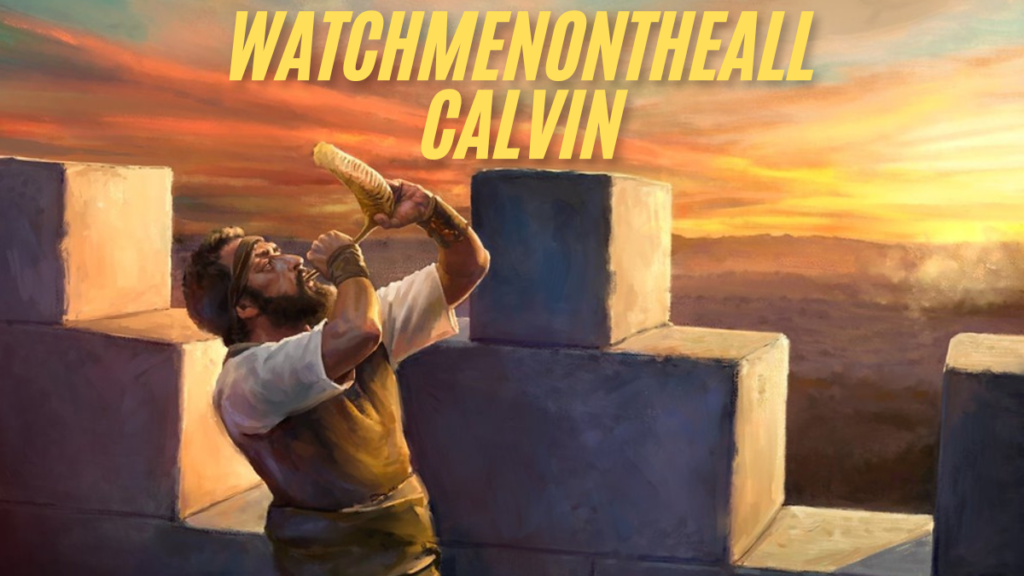Discover pivotal role in Watchmenontheall Calvin and his impact on ministry.
Introduction To WatchmenOnTheall calvin
Watchmen at the Wall is a dynamic movement drawing thought from the lessons of John Calvin and committed to equipping Christian leaders to face as non secular sentinels in modern-day rapidly shifting cultural landscape. Emerging from a deep-seated conviction that the church need to play a proactive function in shaping the moral and spiritual dimensions of society, Watchmenontheall Calvin seeks to empower those who experience referred to as to defend and manual their communities via transformative movement and unwavering faith.
The movement attracts on concepts articulated by way of Calvin, emphasizing the importance of vigilance, discernment, and active engagement within the international as manifestations of a residing religion.
Central to the Watchmen at the Wall ethos is the perception in a covenantal dating with society, grounded in biblical reality and devoted to upholding righteousness and justice. This commitment is contemplated in the urgent call for Christians to remain alert and aware of cultural tendencies that could venture traditional values and doctrines. By fostering a network of leaders who’re well-versed in Calvinist theology and similarly prepared to cope with present day social issues, Watchmen on the Wall endeavors to create a robust platform for advocacy and schooling.
Through seminars, workshops, and strategic networking, members are encouraged to deepen their theological know-how while growing realistic abilties to have interaction successfully with their spheres of have an effect on, making sure the maintenance of key tenets of the Christian religion.
The Influence Of John Calvin On Modern Theology
John Calvin, a outstanding theologian of the Protestant Reformation, has exerted a profound and lasting have an effect on on contemporary theology. His emphasis at the sovereignty of God, predestination, and the authority of Scripture laid the foundation for what would turn out to be Reformed theology, a tradition that keeps to thrive in various forms today. Calvin’s magnum opus, “Institutes of the Christian Religion,” systematically mentioned his theological perspectives and has served as a foundational textual content for Reformed church buildings international.
His thoughts at the absolute sovereignty of God and the whole depravity of humanity task people to rethink the nature of humanity’s courting with the divine. Calvin’s doctrine of predestination, even though contentious, sparked wealthy theological discussions which have motivated several Christian denominations, leading to a deeper exploration of the concept of grace. His insistence on the centrality of Scripture has strengthened the importance of biblical exegesis, paving the way for a greater non-public and on hand relationship with the Bible.
Furthermore, Calvin’s thoughts contributed to shaping Protestant paintings ethics and the improvement of capitalist economies by means of encouraging tough paintings as a shape of religious field. His enduring effect is seen in how cutting-edge theology values systematic strategies to know-how religion, a legacy that underscores his role as a essential discern in the shaping of modern Christian notion.
Founding Principles Of Watchmen On The Wall
Watchmen on the Wall stands as a testament to the core ideals and enduring values that guide its purpose and challenge. At the coronary heart of its founding concepts is a steadfast dedication to guardianship and vigilance, stimulated by the biblical metaphor of watchmen who remain alert to guard their groups. This idea extends past mere observation, disturbing unwavering dedication to nurturing and safeguarding ethical and religious properly-being inside society.
The using pressure at the back of Watchmen on the Wall is rooted in a choice for transformation that stems from a deep-seated faith in divine truth and knowledge. Anchored in Calvinist traditions, it emphasizes the sovereignty of God, the authority of Scripture, and the necessity for a existence committed to righteousness and provider.
The employer promotes lively engagement with cultural, political, and social problems, encouraging individuals to stand firm of their ideals while advocating for justice and integrity in all spheres of lifestyles. It urges its participants to be proactive in their groups, fostering an environment of affection, recognize, and kindness while hard the ones societal norms that stray from scriptural values. Watchmenontheall Calvin believes in empowering people with expertise and braveness, equipping them to influence wonderful change.
This holistic method no longer simplest seeks to shield but to encourage transformative action that aligns with the tenets of religion, wish, and love.
Calvinist Theology In Watchmen’s Teachings
Calvinist theology performs a extensive function within the teachings of “Watchmen at the All,” a group recognised for its emphasis on vigilance and religious preparedness. Central to Calvinism are standards consisting of predestination and the sovereignty of God, which underline the belief that God’s will is last and unchangeable. This theological perspective resonates deeply within the organization’s doctrine, framing its know-how of divine windfall and human life.
In “Watchmen at the All,” the sovereignty of God is often highlighted as a name for believers to remain alert and faithful, trusting in God’s overarching plan even as actively undertaking religious vigilance.
The idea of total depravity, every other center guideline of Calvinism, in addition affects the watchmen’s teachings. Believing that human nature is basically flawed and incapable of accomplishing salvation on its very own, “Watchmenontheall Calvin” advocates for complete reliance on divine grace. This aligns with their emphasis on watchfulness, as participants are endorsed to constantly defend against sin and temptation, knowing that human efforts are insufficient without God’s intervention.
The doctrine of perseverance of the saints is likewise fundamental, reinforcing the notion that proper believers will persist in faith and commitment regardless of challenges. Thus, Calvinist theology offers a framework that shapes the institution’s task, encouraging adherents to stay vigilant in religion even as trusting God’s sovereign will.
The Role Of Watchmen In Contemporary Society
In present day society, the function of watchmen is multifaceted and maintains to adapt amidst technological improvements and shifting societal norms. Traditionally tasked with the duty of overseeing and protecting groups, watchmen have served as guardians, ensuring safety and order inside their realms. Today, their responsibilities have broadened, reflecting the complexities of modern-day lifestyles. As city areas grow and diversify, watchmen are an increasing number of required to evolve to numerous cultural and social dynamics, fostering a feel of security in communities which might be regularly bustling and densely populated.
Moreover, technology plays a crucial role in shaping the work of watchmen, who now often depend upon sophisticated surveillance systems, information analysis, and digital conversation gear to enhance their vigilance. In this technologically interconnected international, watchmen not handiest make contributions to bodily safety but additionally help in digital safety and the safety of sensitive records, thus expanding their purview beyond the tangible to safeguard towards cyber threats.
The position of watchmen additionally encompasses social obligations, as they work to engender accept as true with and rapport with network members. By appearing as liaisons between law enforcement and the public, watchmen can alleviate tensions and sell network concord, proving important in warfare resolution. In essence, watchmen are essential figures in present day society, serving as each protectors and network stewards in a swiftly converting international.
Future Perspectives On Watchmen And Calvinist Thought
As we look toward the future, the interaction between the subject matters in “Watchmen” and Calvinist thought gives a fascinating landscape for exploration. The philosophical underpinnings of Calvinism, with its emphasis on predestination and the sovereignty of God, provide a rich context for analyzing the characters and narrative arcs inside “Watchmen.” The concept of predestination may be juxtaposed in opposition to the deterministic global of “Watchmen,” wherein the characters grapple with their perceived roles and destinies amidst a chaotic and morally complex universe.
This evaluation invites a deeper analysis of ways duty and moral business enterprise are depicted within each frameworks.
Furthermore, the emphasis on inherent depravity in Calvinist thought aligns intriguingly with the unsuitable nature of “Watchmen’s” characters. This parallel paves the way for an exploration of redemption and charm in a international fraught with corruption and depression. As future thinkers and theologians interact with these themes, there may be potential for expanding the discourse on how man or woman movements healthy inside a predetermined plan, and the way human fallibility may be reconciled with divine motive.
Therefore, the relationship among “Watchmen” and Calvinism gives a compelling platform for future discourse, prompting similarly exam of timeless questions concerning free will, ethical responsibility, and spiritual determinism in an ever-evolving societal and theological panorama.






